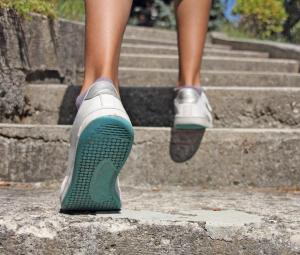
About a year ago, I wrote a post urging people to “make your day harder,” arguing that making small choices like taking the stairs instead of the elevator could make a big difference to your overall fitness and mobility. Now, researchers have released a study confirming that sporadic bits of activity during the day that add up are as effective for overall heart health and mortality as the same amount of exercise in a single burst.
Researchers analysed activity and mortality data from nearly 5000 people over a 7 year period, and concluded that a goal of a total of 150 minutes of moderate to vigorous physical activity every week made a difference to how long people in the study lived. The new information here is the confirmation that these 150 minutes don’t need to be in 10 minute or longer episodes, but can be accumulated in shorter increments. The duration matters less than the total. A full description of the study implications can be found here: “your half assed attempts at exercise are still really good for you.
I’ve written before about how counting steps and episodes of exercise is a motivator for me, so I was glad to read this. It’s good to know that the days where all I manage to do is hit my step target “count” for something as much as the days where I do a ridiculously intense two hour spinning class (don’t even get me started). It also fits with my big hobbyhorse about staying as mobile and active as possible as we age. Not everyone needs to be doing long bike rides or triathlons, but everyone can aim at hitting 150 minutes of activity in a week.
More than mobility, though, I’m glad to see affirmation that small healthy choices can be super meaningful. We were passing around another piece in the blog community this week about new data from the UK about the causes of preventable cancers (only about 43% of all cancers, which is a whole other topic).
According to this data, the most significant cause of preventable cancer is smoking, followed by diet and exercise. As one blogger wrote about it, “The person who eats healthily, avoids alcohol and keeps active, yet struggles with their weight, is less likely to get cancer than the skinny couch potato living on bacon washed down with gin.”
I don’t fully agree with that blogger’s interpretation of the data — weight is still a meaningful factor according to this information, right behind smoking, diet and exercise — and I would add “avoiding the sun” to any list of healthful practices. But I do fully agree with her strong message that healthful choices come from making smart decisions about what you put into your body (whether ingested through the lungs or through your mouth), and from recognizing that food really is fuel for a body that moves and functions well, both internally and externally. Trying to lose weight through fad diets or starving yourself is not a healthful move.

I think what all of this adds up to for me is that yes, that yummy grain bowl with tons of kale and orange veggies is a smart thing to do and can have a long term impact on health — and yes, we can “eat the damn cupcake.” At the end of the day, if your goal is to live with a body that works as well as your personal body can, we should be making small choices continually to move throughout the day, and we should be paying serious attention to what we put into our bodies. Take the stairs, listen to your nagging fitbit to walk a few hundred steps every hour, take a brisk walk around the block when you have 5 minutes, fit in that short workout that might not seem worth it; eat almonds instead of that meeting cookie, have a grain bowl instead of a burger, savour that piece of organic dark chocolate. Our choices don’t have to be “perfect” to matter — but making small healthy choices adds up.
I wouldn’t necessarily put ‘weight’ in the same category as smoking etc. for the simple reason that not all body fat is equal. There’s plenty of research showing that visceral fat (i.e. located in the body cavity around the organs) is far more problematic than subcutaneous fat. And people who do greater amounts of exercise, including everyday activity, are less likely to have the visceral sort (and endurance exercise is a good way of getting rid of it, as is fasting).
Also, as your blog is thought-provoking on the intersections of health with social issues, I’d definitely recommend checking out the article in the Guardian:
https://tinyurl.com/y7de8dyv
Thanks for the comment — I agree and I didn’t parse that piece deeply enough. “Weight” was a category on its own in the UK data, and the blogger I quoted was making the point that diet and exercise were more important (which I agree with), but I didn’t go deeper. I appreciate this article — thanks for the link 😉
Thanks. Great Guardian piece.